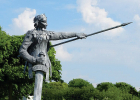Power
The accumulation of, the acceptance of, and the use of power are all explored in this section. The individual reigns of some monarchs are looked at such as those from the Tudor period, but so are other leaders, despotic and revolutionary. Contemporary issues of the use of power in a democracy are explored are more complex ideas around power through individual actions and movements in history.
Sort by:
Date (Newest first) | Title A-Z
Show:
All |
Articles |
Podcasts |
Multipage Articles
-

Film series: Tudor Royal Authority
ArticleClick to view -

Film: Henry VII and Tudor Royal Authority
ArticleClick to view -

Film: Edward VI and Tudor Royal Authority
ArticleClick to view -

Film: Mary I and Tudor Royal Authority
ArticleClick to view -

Film: Elizabeth I and Tudor Royal Authority
ArticleClick to view -

Film: Personality and Tudor Royal Authority – discussion
ArticleClick to view -

Film: The significance of advisers – discussion
ArticleClick to view -

Film: Religion and Tudor Royal Authority – discussion
ArticleClick to view -

Film: Foreign Relations and Tudor Royal Authority – discussion
ArticleClick to view -

Film: Domestic Politics and Tudor Royal Authority – discussion
ArticleClick to view -

Film: Writing history - The Life & Legend of the Sultan Saladin
ArticleClick to view -

The Georgian Papers – a virtual ‘madness’
2nd December 2019Click to view -

Fake news: Psy-war and propaganda in the Indonesian Genocide of 1965-66
ArticleClick to view -

Peterloo: HA interview with Mike Leigh and Jacqueline Riding
ArticleClick to view -

The Tudor monarchy in Ireland
ArticleClick to view -

Æthelflæd, Lady of the Mercians, 918-2018
ArticleClick to view -

My Favourite History Place: The North Wessex Downs and Cwichelm’s Barrow
ArticleClick to view -

Anglo-Saxon women and power
ArticleClick to view -

New light on Rendlesham
ArticleClick to view -

Podcast: Medlicott Lecture 2018 - Justin Champion
ArticleClick to view

